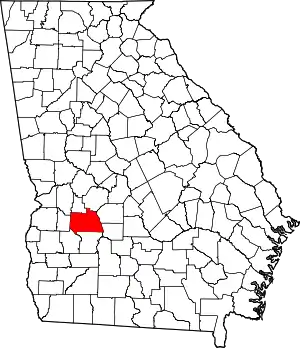De Soto, Georgia
De Soto is a city in Sumter County, Georgia, United States. The population was 214 at the 2000 census. It is part of the Americus Micropolitan Statistical Area.
De Soto, Georgia | |
|---|---|
 GA30/US280EB, Desoto City limit | |
 Location in Sumter County and the state of Georgia | |
| Coordinates: 31°57′17″N 84°4′3″W | |
| Country | United States |
| State | Georgia |
| County | Sumter |
| Area | |
| • Total | 0.82 sq mi (2.11 km2) |
| • Land | 0.82 sq mi (2.11 km2) |
| • Water | 0.00 sq mi (0.00 km2) |
| Elevation | 308 ft (94 m) |
| Population (2020) | |
| • Total | 124 |
| • Density | 151.96/sq mi (58.71/km2) |
| Time zone | UTC-5 (Eastern (EST)) |
| • Summer (DST) | UTC-4 (EDT) |
| ZIP code | 31743 |
| Area code | 229 |
| FIPS code | 13-22472[2] |
| GNIS feature ID | 0355464[3] |
History
The Georgia General Assembly incorporated the place in 1889 as the "Town of De Soto".[4] The community is named for Hernando de Soto, the explorer who discovered the Mississippi River.[5][6]
Geography
De Soto is located at 31°57′17″N 84°4′3″W (31.954674, -84.067633).[7]
According to the United States Census Bureau, the city has a total area of 0.8 square miles (2.1 km2), all land.
Demographics
| Census | Pop. | Note | %± |
|---|---|---|---|
| 1900 | 250 | — | |
| 1910 | 228 | −8.8% | |
| 1920 | 216 | −5.3% | |
| 1930 | 373 | 72.7% | |
| 1940 | 295 | −20.9% | |
| 1950 | 309 | 4.7% | |
| 1960 | 282 | −8.7% | |
| 1970 | 321 | 13.8% | |
| 1980 | 248 | −22.7% | |
| 1990 | 258 | 4.0% | |
| 2000 | 214 | −17.1% | |
| 2010 | 195 | −8.9% | |
| 2020 | 124 | −36.4% | |
| U.S. Decennial Census[8] | |||
2020 census
| Race / Ethnicity | Pop 2000[9] | Pop 2010[10] | Pop 2020[11] | % 2000 | % 2010 | % 2020 |
|---|---|---|---|---|---|---|
| White alone (NH) | 68 | 54 | 30 | 31.78% | 27.69% | 24.19% |
| Black or African American alone (NH) | 140 | 130 | 85 | 65.42% | 66.67% | 68.55% |
| Native American or Alaska Native alone (NH) | 2 | 0 | 0 | 0.93% | 0.00% | 0.00% |
| Asian alone (NH) | 0 | 4 | 0 | 0.00% | 2.05% | 0.00% |
| Pacific Islander alone (NH) | 0 | 0 | 0 | 0.00% | 0.00% | 0.00% |
| Some Other Race alone (NH) | 0 | 0 | 0 | 0.00% | 0.00% | 0.00% |
| Mixed Race/Multi-Racial (NH) | 0 | 0 | 0 | 0.00% | 0.00% | 0.00% |
| Hispanic or Latino (any race) | 4 | 7 | 9 | 1.87% | 3.59% | 7.26% |
| Total | 214 | 195 | 124 | 100.00% | 100.00% | 100.00% |
As of the census[2] of 2000, there were 214 people, 78 households, and 53 families residing in the city. The population density was 262.4 inhabitants per square mile (101.3/km2). There were 88 housing units at an average density of 107.9 per square mile (41.7/km2). The racial makeup of the city was 33.18% White, 65.89% African American and 0.93% Native American. Hispanic or Latino of any race were 1.87% of the population.
There were 78 households, out of which 24.4% had children under the age of 18 living with them, 50.0% were married couples living together, 15.4% had a female householder with no husband present, and 30.8% were non-families. 26.9% of all households were made up of individuals, and 14.1% had someone living alone who was 65 years of age or older. The average household size was 2.74 and the average family size was 3.35.
In the city, the population was spread out, with 22.9% under the age of 18, 8.4% from 18 to 24, 29.0% from 25 to 44, 22.0% from 45 to 64, and 17.8% who were 65 years of age or older. The median age was 40 years. For every 100 females, there were 103.8 males. For every 100 females age 18 and over, there were 94.1 males.
The median income for a household in the city was $20,375, and the median income for a family was $37,500. Males had a median income of $19,000 versus $15,714 for females. The per capita income for the city was $11,388. About 1.8% of families and 12.2% of the population were below the poverty line, including 4.8% of those under the age of eighteen and 8.5% of those 65 or over.
Politics
In 2010, the city was cited by the Georgia Secretary of State's office for failing to hold regular elections in 2009, as well as being unable to document any elections from 2005 through 2007. A De Soto councilmember apologized by saying that the city simply "forgot" about the need to hold an election. Facing a number of state violations, the city promised to remedy the situation permanently by outsourcing the elections process to a third party. The state provided that the 2009 election must be held by March 2010.[12]
References
- "2020 U.S. Gazetteer Files". United States Census Bureau. Retrieved December 18, 2021.
- "U.S. Census website". United States Census Bureau. Retrieved January 31, 2008.
- "US Board on Geographic Names". United States Geological Survey. October 25, 2007. Retrieved January 31, 2008.
- Acts of the General Assembly of the State of Georgia. Clark & Hines, State Printers. 1889. p. 944.
- Gannett, Henry (1905). The Origin of Certain Place Names in the United States. Govt. Print. Off. pp. 105.
- Krakow, Kenneth K. (1975). Georgia Place-Names: Their History and Origins (PDF). Macon, GA: Winship Press. p. 61. ISBN 0-915430-00-2.
- "US Gazetteer files: 2010, 2000, and 1990". United States Census Bureau. February 12, 2011. Retrieved April 23, 2011.
- "Census of Population and Housing". Census.gov. Retrieved June 4, 2015.
- "P004 HISPANIC OR LATINO, AND NOT HISPANIC OR LATINO BY RACE – 2000: DEC Summary File 1 – De Soto, Georgia". United States Census Bureau.
- "P2 HISPANIC OR LATINO, AND NOT HISPANIC OR LATINO BY RACE – 2010: DEC Redistricting Data (PL 94-171) – De Soto, Georgia". United States Census Bureau.
- "P2 HISPANIC OR LATINO, AND NOT HISPANIC OR LATINO BY RACE - 2020: DEC Redistricting Data (PL 94-171) - De Soto, Georgia". United States Census Bureau.
- Jeffers, Wainwright (2010-01-14). City forgot to hold 2009 election. WALB News 10, 14 January 2010. Retrieved on 2010-01-17 from http://www.walb.com/global/story.asp?s=11819734.
